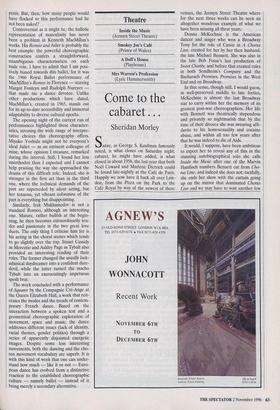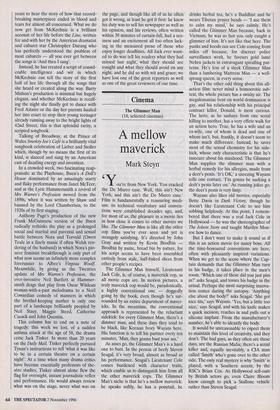Theatre
Inside the Music (Jermyn Street Theatre) Smokey Joe's Café (Prince of Wales) A Doll's House (Playhouse) Mrs Warren's Profession (Lyric Hammersmith)
Come to the cabaret ...
Sheridan Morley
Satire, as George S. Kaufman famously noted, is what closes on Saturday night; cabaret, he might have added, is what closed in about 1956, the last year that both Noel Coward and Marlene Dietrich could be found late-nightly at the Café de Paris. Happily we now have it back all over Lon- don, from the Pizza on the Park to the Café Royal by way of the newest of these
venues, the Jermyn Street Theatre where for the next three weeks can be seen an altogether wondrous example of what we have been missing all these years.
Donna McKechnie is the American dancer and singer who won a Broadway Tony for the role of Cassie in A Chorus Line, created for her by her then husband, the late Michael Bennett. She was also in the late Bob Fosse's last production of Sweet Charity, and before that created roles in both Sondheim's Company and the Bacharach Promises, Promises in the West End and on Broadway.
In that sense, though still, I would guess, in well-preserved middle to late forties, McKechnie is almost the last Broadway star to carry within her the memory of its greatest post-war choreographers. Her life with Bennett was theatrically stupendous and privately so nightmarish that by the time of their divorce she was swearing affi- davits to his homosexuality and cocaine abuse, and within all too few years after that he was indeed to die of Aids.
It would, I suppose, have been ambitious to expect her to reveal any of this in the stunning autobiographical solo she calls Inside the Music after one of the Marvin Hamlisch numbers Bennett cut from Cho- rus Line, and indeed she does not: tactfully, she ends her show with the curtain going up on the mirror that dominated Chorus Line and we may have to wait another few years to hear the story of how that record- breaking masterpiece ended in blood and tears for almost all concerned. What we do now get from McKechnie is a brilliant account of her life before the Line, written for and with her by the American dramatist and cabaret star Christopher Durang who has perfectly understood the problem of most cabarets — all you ever get between the songs is 'And then I sang'.
Instead, he has created a script of consid- erable intelligence and wit in which McKechnie can tell the story of the first half of her life through all the songs that she heard or created along the way. Barry Mishon's production is minimal but hugely elegant, and whether McKechnie is recall- ing the night she finally got to dance with Fred Astaire or the day her parents hauled her into court to stop their young teenager already running away to the bright lights of 42nd Street, this is that splendid rarity, a. scripted songbook.
Talking of Broadway, at the Prince of Wales Smokey Joe's Café is a brilliantly vital songbook celebration of Lieber and Stoller which, though by no means the first of its kind, is danced and sung by an American cast of dazzling energy and invention.
In a crowded week, two fascinating reap- praisals: at the Playhouse, Ibsen's A Doll's House dominated by an amazingly starry and flaky performance from Janet McTeer, and at the Lyric Hammersmith a revival of Mrs Warren's Profession moved from the 1890s, when it was written by Shaw and banned by the Lord Chamberlain, to the 1920s of its first staging.
Anthony Page's production of the new Frank McGuinness version of the Ibsen radically rethinks the play as a prolonged social and marital and parental and sexual battle between Nora and Torvald (Owen Teale in a finely manic if often Welsh ren- dering of the husband) in which Nora's pio- neer feminist breakthrough is only part of what now seems an infinitely more complex forerunner to Albee's Virginia Woolf Meanwhile, by giving us the Twenties update of Mrs Warren's Profession, the ever-inventive Neil Bartlett at Hammer- smith drags that play from Oscar Wildean woman-with-a-past melodrama to a Noel Cowardian comedy of manners in which the brothel-keeping mother is only one part of a landscape brilliantly peopled by Neil Stacy, Maggie Steed, Catherine Cusack and John Quentin.
This column has to end on a note of tragedy: this week we lost, of a sudden asthma attack at the age of 58, the drama critic Jack Tinker. In more than 20 years on the Daily Mail, Tinker perfectly pursued Tynan's instructions to tell 'what it was like to be in a certain theatre on a certain night'. At a time when many drama critics have become essentially professors of the- atre studies, Tinker almost alone flew the flag for overnight, instant journalistic reflex and performance. He would always review what was on the stage, never what was on the page, and though like all of us he often got it wrong, at least he got it first: he knew his duty was to sell his newspaper as well as his opinion, and his reviews, often written within 30 minutes of curtain-fall, had a sex- iness and an excitement all too often lack- ing in the measured prose of those who enjoy longer deadlines. All Jack ever want- ed to do was tell his readers what they had missed last night, what they should see tonight and what they should avoid on any night, and he did so with wit and grace; we have lost one of the great reporters as well as one of the great reviewers of our time.



















































































 Previous page
Previous page